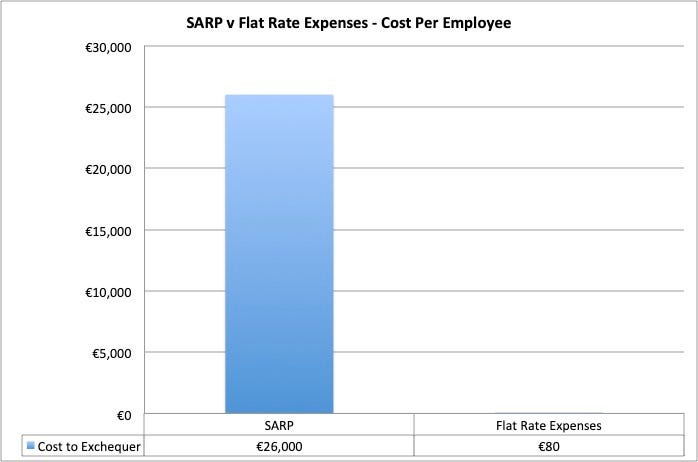Almost 80,000 retail, bar and pharmacy workers are set to lose their flat rate expenses on January 1st 2020 so the government can hand a bonanza to highly-paid millionaire executives.
Retail, pharmacy and bar workers are currently entitled to claim between €93-€400 in a flat rate tax relief for costs incurred during their employment. For instance, the purchase, maintenance and cleaning of uniforms, as well as the purchase of tools of the trade, stationary and other essential work items.
Revenue has decided that low paid workers should lose these flat rate expenses while the Irish government appears happy to stand idly by as Mandate Trade Union members lose a valuable benefit they have enjoyed since the 1970s.
For a retail worker, they benefit by a measly €40 per year which barely covers the cost of cleaning their uniforms.
Revenue argue that workers can still make the claim, but that they must have receipts for any expenses. If they’d only be kind enough to suggest how you get a receipt for the electricity used when washing your clothes, or how to quantify the amount of washing powder needed per uniform?
The overall Flat Rate Espenses system was utilised by 600,000 workers in 2017 costing the exchequer €48m in total — or an average cost to the state of €80 per worker. We would argue this is hardly worth taking off low paid workers.
But then, perhaps revenue has decided others are more deserving?
SARP
In the 2020 Budget the Irish government announced the extension of the Special Assignee Relief Programme (SARP) scheme which gives tax relief of 30% on income over €75,000 to executives from foreign owned companies who are re-located to Ireland.
Revenue figures showed 18 people earning between €1 million and €10 million a year had benefitted from the scheme in 2016, with four of those people on salaries in excess of €3 million.
A detailed breakdown of costs involved showed how a person on €3 million a year would pay €351,000 less in tax under the scheme while someone on €9 million would get a €1.07 million write-off.
Part of the scheme also allows for tax relief on private school fees of up to €5,000 per child.
According to records, €600,000 worth of private tuition had been claimed for in 2016, the last year for which figures are available.
Meanwhile, the salaries of the teachers in those private schools are paid by you, the taxpayers.
SARP will be extended for another two years with it costing the exchequer €28.1m in tax foregone in 2017 and benefitting only 1,084 employees.
Think about that:
— the SARP scheme cost an average €26,000 for the 1,084 workers who availed of it; while
— the Flat Rate Expense system cost an average of €80 for the 600,000 workers who availed of it.
Can you see who the State prioritises?


KEEP
Then there’s the Key Employee Engagement Programme (KEEP).
KEEP is an incentive brought in by the Irish government in 2017 that allows companies to pay executives up to €300,000 in shares which they do not have to pay income taxes on (PAYE, USC or PRSI).
The employee makes savings by only paying tax at the lower Capital Gains Tax rate of 33% when disposing of those shares, instead of the marginal income tax rate of 52% (PAYE, USC and PRSI combined). It was estimated in the last two Budgets that this would cost €10m per year.
So, join the dots. Highly paid executives are being awarded tax reliefs worth €40m per year while revenue is cutting Flat Rate Expenses from low paid workers saving €48m.
We have four by-elections coming up in Cork, Wexford and two in Dublin. It would do no harm to let politicians know what you think of these policies.
— — — — — — — — — — — — —
What are flat rate expenses?
Approximately 50 years ago trade unions negotiated for workers to be able to write off expenses accrued due to their employment for taxation purposes. This relief is for the purchase and maintenance of uniforms, tools and stationary, for instance. However, the flat rate means all workers in an employment category collect the same amount irrespective of how much expense they accrue.
How does it work?
The tax relief must be claimed by the worker because it is not automatically applied by Revenue. However, after you make your first claim, Revenue should have applied it every year thereafter.
The way it operates is quite simple. The relief allocated to your specific employment reduces your taxable income. For instance, if you are a retail worker and you earn €20,000 per year, your taxable income is reduced by €121 bringing it to €19,879.
What are the allowances?
The allowances vary based on the role you are employed in. A full list of the 53 employment categories with 134 individual flat rate expenses is available by clicking here. However, the industries appropriate to Mandate membership include:
- Pharmacists — €400
- Pharmaceutical Assistants (formerly known as Assistant Pharmacists) — €200
- Shop Assistants (including supermarket staff, general shop workers, drapery and footwear assistants) — €121
- Bar trade: employees — €93
How do I claim my allowance?
Under Revenue rules you are entitled to claim for the previous four years (2015, 2016, 2017 and 2018). The quickest and easiest way to claim Flat Rate Expenses is through PAYEAnytime, which is available online via Revenue’s MyAccount facility.







